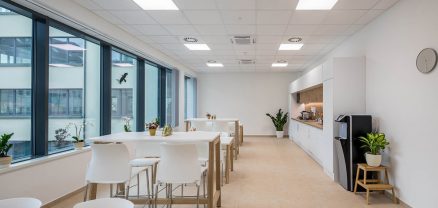Serviced Offices and Intergenerational Collaboration: Bridging the Gap for a Dynamic Future
In the rapidly evolving landscape of office real estate, one trend is quietly transforming how businesses operate and innovate: intergenerational collaboration within serviced offices. As the workforce becomes more diverse – spanning Baby Boomers, Generation X, Millennials, and Generation Z – the traditional office setup is no longer enough. Today’s small businesses and companies are seeking flexible, vibrant environments that foster cross-generational synergy. And serviced offices are stepping up to fill that role, offering more than just a desk – they’re becoming hubs of innovation, learning, and cultural exchange.
The Rise of Serviced Offices: More Than Just a Flexible Space
Serviced offices have revolutionized the way companies think about workspace. They provide ready-to-go environments that eliminate the hassle of traditional leases, offering flexibility, amenities, and a sense of community. For small businesses and startups, this means quick access to professional infrastructure without the hefty commitment. Larger firms, meanwhile, are using serviced offices to test new markets or scale operations without long-term liabilities.
But beyond the convenience and flexibility, serviced offices are cultivating a new kind of office culture – one that’s dynamic, inclusive, and ripe for intergenerational collaboration. These spaces are often designed with shared amenities, communal areas, and networking opportunities that naturally encourage interaction among diverse age groups. The result? A melting pot of ideas, perspectives, and skills that can propel innovation forward.
Why Intergenerational Collaboration Matters in Today’s Office Environment
In a world where innovation is king, the blending of different generational mindsets can be a game-changer. Older employees bring experience, institutional knowledge, and a steady hand – traits that are invaluable in crisis management and strategic planning. Meanwhile, younger generations inject fresh ideas, digital savvy, and a willingness to challenge the status quo. When these perspectives collide and collaborate, the potential for creative solutions skyrockets.
Serviced offices, with their open layouts and communal areas, serve as the perfect breeding ground for this cross-pollination. No longer confined to traditional hierarchies or siloed teams, employees of all ages can learn from each other, share insights, and foster mentorships that benefit everyone. For small businesses, especially, this environment can accelerate growth by harnessing a broad spectrum of skills and experiences.
Breaking Down Barriers: The Cultural Shift in Modern Workspaces
One of the most compelling aspects of serviced offices is their ability to break down generational barriers. Traditional office settings often inadvertently reinforce age divides – think of rigid hierarchies, siloed departments, or outdated management styles. Serviced offices challenge these norms by emphasizing community, flexibility, and shared purpose.
In these spaces, informal interactions are encouraged – whether it’s a coffee break in the lounge or a collaborative project in a communal workspace. Such interactions foster understanding and respect among different age groups, dispelling stereotypes and nurturing a culture of inclusivity. For small businesses, this cultural shift can translate into increased employee satisfaction, better retention, and a more agile, innovative team.
The Future of Work: Embracing Diversity and Flexibility
Looking ahead, the integration of serviced offices and intergenerational collaboration isn’t just a passing trend – it’s a strategic necessity. As the workforce continues to diversify and technology transforms how we work, businesses that embrace this blend will be better positioned to adapt and thrive.
Flexible office solutions like serviced offices are inherently suited to this future. They allow companies to experiment with different team compositions, foster mentorship programs, and create environments where ideas can flourish regardless of age. For small businesses, this means access to a vibrant ecosystem that nurtures talent, encourages innovation, and keeps pace with a rapidly changing world.
Building Bridges for a Brighter Business Future
Serviced offices are more than just convenient workspaces – they’re catalysts for a new kind of collaboration. By bringing together multiple generations under one roof, they unlock a wealth of knowledge, creativity, and resilience. For small businesses and companies eager to stay ahead of the curve, embracing intergenerational collaboration within these flexible environments isn’t just smart – it’s essential.
In the end, the future of work isn’t about age or hierarchy; it’s about connection, diversity, and shared purpose. Serviced offices stand at the forefront of this revolution, transforming the office landscape into a vibrant community where every generation can learn, innovate, and grow together. And that, perhaps, is the most exciting development in the office real estate market today.

Do not hesitate to contact us
Get in touch, if you have any question


